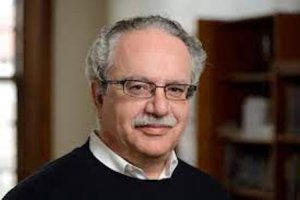Presented By: Aerospace Engineering
Chairs Distinguished Seminar: No equations, no variables, no parameters, no space, no time: Data and the modeling of complex systems

Yannis Kevrekidis
Bloomberg Distinguished Professor
Chemical and Biomolecular Engineering
Applied Mathemetics and Statistics
Medical School
Johns Hopkins University
Emeritus, Princeton Unviersity
About the seminar:
Obtaining predictive dynamical equations from data lies at the heart of science and engineering modeling, and is the linchpin of our technology. In mathematical modeling one typically progresses from observations of the world (and some serious thinking!) first to equations for a model, and then to the analysis of the model to make predictions. Good mathematical models give good predictions (and inaccurate ones do not) - but the computational tools for analyzing them are the same: algorithms that are typically based on closed form equations.
While the skeleton of the process remains the same, today we witness the development of mathematical techniques that operate directly on observations -data-, and appear to circumvent the serious thinking that goes into selecting variables and parameters and deriving accurate equations. The process then may appear to the user a little like making predictions by looking in a crystal ball.
Our work here presents a couple of efforts that illustrate this "new” path from data to predictions. One will be in discovering emergent spaces, in which initially disorganized data can be modeled "easier, better, faster."
The second will be in finding transformations across different models of the same phenomenon - deciding when two systems can be thought of as different observations of the same problem. The third (time permitting) will be in automating the generation of optimal algorithms.
About the speaker:
Yannis Kevrekidis studied Chemical Engineering at the National Technical University in Athens. He then followed the steps of many alumni of that department to the University of Minnesota, where he studied with Rutherford Aris and Lanny Schmidt (as well as Don Aronson and Dick McGehee in Math). He was a Director's Fellow at the Center for Nonlinear Studies in Los Alamos in 1985-86 (when Soviets still existed and research funds were plentiful). He then had the good fortune of joining the faculty at Princeton, where he taught Chemical Engineering and also Applied and Computational Mathematics for 31 years; four years ago he became Emeritus and started fresh at Johns Hopkins (where he somehow is also Professor of Urology). His work always had to do with nonlinear dynamics (from instabilities and bifurcation algorithms to spatiotemporal patterns to data science in the 90s, nonlinear identification, multiscale modeling, and back to data science/ML); and he had the additional good fortune to work with several truly talented experimentalists, like G. Ertl's group in Berlin. When young and promising, he was a Packard Fellow, a Presidential Young Investigator and the Ulam Scholar at Los Alamos National Laboratory. He holds the Colburn, CAST and Wilhelm Awards of the AIChE, the Crawford and the Reid Prizes of SIAM, is a member of the NAE, the American Academy of Arts and Sciences, and the Academy of Athens.
Boeing Lecture Hall (1109 FXB) and Zoom
https://umich.zoom.us/j/91746715474
Bloomberg Distinguished Professor
Chemical and Biomolecular Engineering
Applied Mathemetics and Statistics
Medical School
Johns Hopkins University
Emeritus, Princeton Unviersity
About the seminar:
Obtaining predictive dynamical equations from data lies at the heart of science and engineering modeling, and is the linchpin of our technology. In mathematical modeling one typically progresses from observations of the world (and some serious thinking!) first to equations for a model, and then to the analysis of the model to make predictions. Good mathematical models give good predictions (and inaccurate ones do not) - but the computational tools for analyzing them are the same: algorithms that are typically based on closed form equations.
While the skeleton of the process remains the same, today we witness the development of mathematical techniques that operate directly on observations -data-, and appear to circumvent the serious thinking that goes into selecting variables and parameters and deriving accurate equations. The process then may appear to the user a little like making predictions by looking in a crystal ball.
Our work here presents a couple of efforts that illustrate this "new” path from data to predictions. One will be in discovering emergent spaces, in which initially disorganized data can be modeled "easier, better, faster."
The second will be in finding transformations across different models of the same phenomenon - deciding when two systems can be thought of as different observations of the same problem. The third (time permitting) will be in automating the generation of optimal algorithms.
About the speaker:
Yannis Kevrekidis studied Chemical Engineering at the National Technical University in Athens. He then followed the steps of many alumni of that department to the University of Minnesota, where he studied with Rutherford Aris and Lanny Schmidt (as well as Don Aronson and Dick McGehee in Math). He was a Director's Fellow at the Center for Nonlinear Studies in Los Alamos in 1985-86 (when Soviets still existed and research funds were plentiful). He then had the good fortune of joining the faculty at Princeton, where he taught Chemical Engineering and also Applied and Computational Mathematics for 31 years; four years ago he became Emeritus and started fresh at Johns Hopkins (where he somehow is also Professor of Urology). His work always had to do with nonlinear dynamics (from instabilities and bifurcation algorithms to spatiotemporal patterns to data science in the 90s, nonlinear identification, multiscale modeling, and back to data science/ML); and he had the additional good fortune to work with several truly talented experimentalists, like G. Ertl's group in Berlin. When young and promising, he was a Packard Fellow, a Presidential Young Investigator and the Ulam Scholar at Los Alamos National Laboratory. He holds the Colburn, CAST and Wilhelm Awards of the AIChE, the Crawford and the Reid Prizes of SIAM, is a member of the NAE, the American Academy of Arts and Sciences, and the Academy of Athens.
Boeing Lecture Hall (1109 FXB) and Zoom
https://umich.zoom.us/j/91746715474